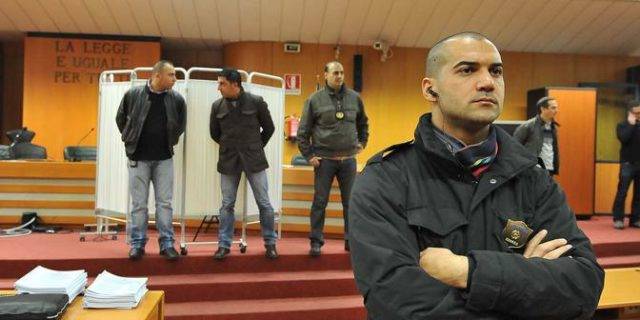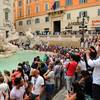Supergrass Gaspare Spatuzza links Italy's Premier Silvio Berlusconi to the Mafia
ROME – Unusual for orderly Turin, police blocked off all access to the street where a court met in session on Friday. The reason: Mafia supergrass Gaspare Spatuzza was to give evidence in the appeals trial of Senator Marcello Dell’Utri, co-founder of Premier Silvio Berlusconi’s political movement Forza Italia in 1993. Two hundred journalists, including numerous from the foreign press, had already obtained accreditation to the Palermo court, meeting in Turin for reasons of security.
Dell’Utri, born in Sicily, has already been convicted by a lower court and sentenced to nine years for outside support in a Mafia-type association. He also plea-bargained on charges of fiscal fraud, for which he received a sentence of two years and three months. He has admitted knowing a Mafia underling named Vittorio Mangano, who—according to a Palermo court—acted as a protector of the Berlusconi children in the family villa at Arcore during the Seventies, when North Italian industrialists were plagued by kidnappings for ransom; other industrialists sent their families to live in Switzerland for the same reason. In 1984 he became a director of the Berlusconi financial group Fininvest.
New allegations by Mafia “pentiti” go beyond the possible personal role of Dell’Utri. The claim is that the late Mafia-implicated long-time mayor of Palermo Vito Ciancimino was actively involved in negotiations between the government in the early 1990’s and the Mafia bosses, who were seeking more lenient treatment in prison and other favors. The chief source for these allegations of secret negotiations is Ciancimino’s son, Massimo, who has given inquiring magistrates copies of documents inherited from his father which, he says, list the Toto Riina-led Mafia’s requests from the government. Massimo Cianicimino’s house was burgled shortly after this report made headlines in Italy. Supposedly Vito Ciancimino acted as go-betweens together with a Carabinieri colonel.
The theorem behind all this—and the reason why so many journalists attended today’s trial session—is that, if Spatuzza and Ciancimino are to be believed, the Mafia had two seasons of anti-state violence intended to show its muscle prior to any bargaining. During the first period Judge Giovanni Falcone and Prosecutor Paolo Borsellino, heroes of the maxi-trial in Palermo, were murdered in 1992. The second period was during the turbulent year of 1993, when a technical (“babysitter”) government was installed by President Francesco Cossiga, and Forza Italia was created as a political action movement. That year a series of Mafia bombings took place, not in the South, but in the North of Italy (Rome, Florence, Milan). One at the Uffizi Museum killed six. These bombings have been seen as threats to the cultural heritage of Italy and to tourism, as opposed to more conventional Mafia crime.
At midday Friday Spatuzza took the witness stand, speaking behind a screen as had Mafia witnesses at the famous maxi-trial of Palermo in 1986. In his testimony today Spatuzza affirmed that a mafioso named Giuseppe Graviano had claimed that Dell’Utri and Silvio Berlusconi were their points of reference. Supposedly a note—a pizzino, in Mafia parlance—exists saying that the meeting would be “as usual in the cemetery” with our friend the [unnamed] senator.
No further evidence yet supports this or other claims, and a judge has pointedly declared that Premier Berlusconi is absolutely not under judiciary investigation. Indeed, according to Spatuzza, Graviano identified his alleged political contacts simply as “the folks from Canale 5.” Although Canale 5 TV network was and is a Berlusconi property. not surprisingly, Berlusconi’s supporters scathingly call this the open season for hunting down Berlusconi, a victim—to quote Libero, a rightist newspaper—of a “media-judiciary circus.”
Nevertheless, as a result of Spatuzza’s claims, Graviano will be heard by the court via a video-conference along with two fellow Mafia associates, his brother Filippo Graviano and Cosimo Lo Nigro, on December 11.
On Friday the leaders of the Italian left parties, with rare exceptions, shied away from harsh reactions to the claims by Spatuzza, saying that they would await the outcome of the judiciary process. Until confirmed, Spatuzza's declarations amounted to hearsay, and even the often fractious Antonio Di Pietra, the former magistrate who heads the party called Italia dei Valori, was cautious.
In an interview with the Rome daily Il Messaggero Luciano Violante, former magistrate as well as former president of the Chamber of Deputies, warned that Spatuzza may still represent the Graviano Mafia clan, and that "the Mafia does what it wants only when it has a purpose." In this case, he suggests, the purpose may be to signal that the Mafia considers Silvio Berlusconi on his way out. In this case they are showing their availability to potential successors. Who? Violante does not say, but the obvious conclusion is that the Northern League is creating splinters elsewhere, including in Sicily, and that this interest in future alliances may explain the maneuvers currently taking place behind the scenes. On the other hand Giuseppe Ayala, yet another former magistrate (as a prosecutor he worked with Judge Falcone), said, "One can hardly remain indifferent" to Spatuzza's allegations.
Meanwhile Berlusconi's allies retort that the Mafia is attacking the Premier because he has worked to eliminate organized crime. Berlusconi's erstwhile enemy (and possible successor) Gianfranco Fini agreed: "The Mafia is attacking Berlusconi because he combats it." Berlusconi's lawyers say they intend to sue Spatuzza.





































i-Italy
Facebook
Google+
This work may not be reproduced, in whole or in part, without prior written permission.
Questo lavoro non può essere riprodotto, in tutto o in parte, senza permesso scritto.